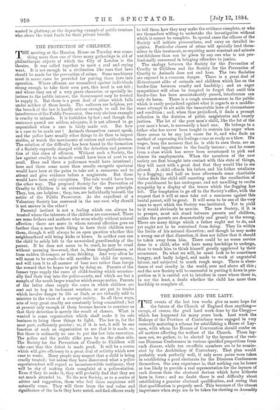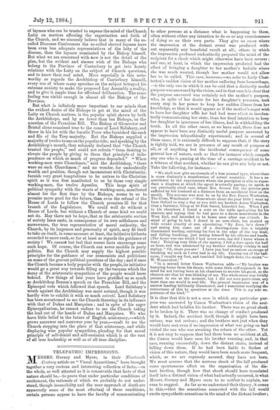THE BISHOPS AND THE LAITY. T HE events of the last
two weeks give us more hope for the future of the Church of England than anything— except, of course, the good hard work done by the Clergy— which has happened for many years back. Last week the Bishops of the Province of Canterbury were engaged in very earnestly maturing a scheme for establishing a House of Lay- men, with whom the Houses of Convocation should confer on all matters affecting the welfare of the Church. These lay- men are, we gather, to be elected by the laymen of the vari- ous Diocesan Conferences in various specified proportions from each diocese, while ten ex-officio members are to be nomin- ated by the Archbishop of Canterbury. That plan would probably work perfectly well, if only more pains were taken in establishing a good electorate for the Diocesan Conferences themselves. Our own experience is, that nothing can be looser or less likely to provide a real representation for the laymen of each diocese than the electoral devices which have hitherto been in force ; and no doubt there is real difficulty about establishing a genuine electoral qualification, and seeing that that qualification is properly used. This becomes of the utmost importance when steps are to be taken for electing an Assembly
of laymen who can be trusted to express the mind of the Church Laity on matters affecting the organisation and faith of the Church, and we sincerely believe that in many of the so- called Diocesan Conferences the so-called elected laymen have been even less adequate representatives of the laity of the diocese, than the laymen nominated by the Bishop himself, But what we are concerned with now is not the detail of the plan, but the evident and sincere wish of the Bishops who belong to the Province of Canterbury to get into hearty relations with the Laity on the subject of Church questions, and to know their real mind. More especially is this note- worthy as regards the Archbishop of Canterbury himself, every one of whose many speeches on the subject betrayed his extreme anxiety to make the proposed Lay Assembly a reality, and to give it ample time for effectual deliberation. The same feeling was visible enough in almost all the Bishops of the Province.
But what is infinitely more important to our minds than the evident desire of the Bishops to get at the mind of the Laity on Church matters, is the popular spirit shown by both the Archbishops, and by no fewer than ten Bishops, on the question of the Franchise Bill. The Bishop of Gloucester and Bristol alone remained true to the cause of Lord Salisbury, and threw in his lot with the bucolic Peers who furnished the rank and file of the Tory majority. But the Bishops supplied a majority of twelve to one on the popular side ; and speaking by the Archbishop's mouth, they solemnly declared that "the Church trusted the people," and could not refrain " from desiring to elevate the people by giving to them that principle of inde- pendence on which so much of progress depended." " When working-men were Churchmen," said the Archbishop, " there were no such Churchmen ;" and no wonder, for undoubtedly wealth and position, though not inconsistent with Christianity, furnish very great temptations to be untrue to the Christian spirit as it was first manifested to us by those very simple
working-men, the twelve Apostles. This large spirit of political sympathy with the wants of working-men, manifested almost for the first time by the Bishops, seems to us to promise more good for the future, than even the refusal of the House of Lords to follow the Church promises ill for that branch of the Legislature. We could well do without a House of Lords, but without a Church of some kind we could not do. May there not be hope, that as the aristocratic section of society loses caste, in consequence of its own selfishness and narrowness, the true representative of moral authority, the Church, by its largeness and generosity of spirit, may fit itself to take on itself, in some measure at least, the initiative hitherto accorded to mere rank, so far at least as regards the guidance of society ? We cannot but feel that recent facts encourage some such hope. Of course, the Church can never meddle in party politics. But the Church may supply the highest possible principles for the guidance of our economists and politicians on some of the gravest political questions of the day ; and if once the Church became a body popular with the people, its initiative would go a great way towards filling up the vacuum which the decay of the aristocratic sympathies of the people would leave behind. Few things of late years have gratified us so much as Archbishop Benson's speech on the Franchise Bill, and the Episcopal vote which followed that speech. Lord Salisbury's wrath against the Archbishop was most natural, though it was hardly wise to exhibit it with so much naivete'. Lord Salisbury has been accustomed to see the Church throwing in its influence with that of Dukes and Marquises ; and in spite of his eager Episcopalianism, he cannot endure to see the Church taking the lead out of the hands of Dukes and Marquises. We who have little belief in the future of English aristocracy,—whieh grows narrower and narrower year by year,—exult to see the Church stepping into the place of that aristocracy, and while displaying wise popular sympathies, pleading for that moral principle of self-denial and self-restraint which is at the root of all true leadership as well as of all true discipline.

































 Previous page
Previous page